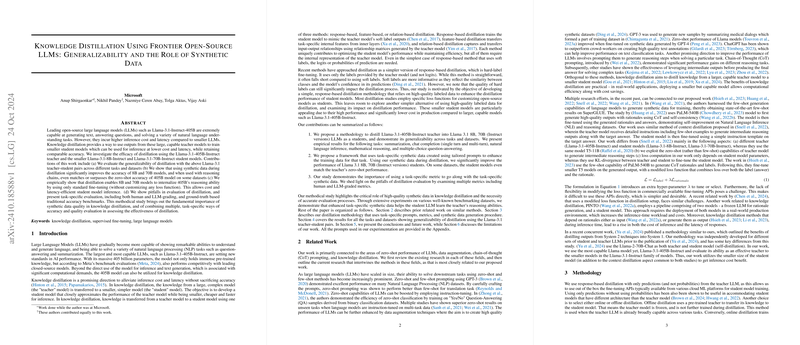Knowledge Distillation Using Frontier Open-Source LLMs: Generalizability and the Role of Synthetic Data
The presented paper investigates the concept of knowledge distillation in the context of LLMs with a specific focus on the Llama-3.1-Instruct series. With Llama-3.1-405B-Instruct as the teacher model, the authors examine the efficiency and effectiveness of distilling knowledge into smaller student models, namely, Llama-3.1-8B-Instruct and Llama-3.1-70B-Instruct. The paper outlines a methodological framework aimed at reducing computational costs associated with powerful, large-scale models while maintaining high performance levels on various natural language tasks.
The methodological contributions of this paper are numerous, beginning with an evaluation of the distillation process across different tasks and datasets. The researchers concentrated on ensuring the small student models retained the high reasoning and comprehension capabilities of the teacher model. They advocate for the use of synthetic data, which was demonstrated to significantly elevate the performance of students models, often reaching or surpassing the zero-shot efficacy of the much larger teacher on specific datasets.
Methodology
The authors describe a systematic two-step process of knowledge distillation: generating outputs using advanced, task-specific prompts from the teacher model, and subsequently fine-tuning the student models using these outputs. Their methodology leverages task-specific synthetic data, derived from prompts that enhance the training data quality. These advanced strategies notably involve chain-of-thought (CoT) and chain-of-density prompting aimed at ensuring that crucial nuances and reasoning steps are replicated in the distilled models.
Results
The paper provides experimental evidence that supports the viability and effectiveness of the proposed distillation strategy:
- Summarization Tasks: Distillation with chain-of-density prompting resulted in models that outperformed the larger teacher LLM's vanilla-prompted outputs—achieving notably higher entity densities in summaries.
- Conversational Tasks: On conversational datasets, the distilled 70B model surpassed the base teacher model's performance on certain evaluation metrics, showing strong alignment with desired response qualities.
- Natural Language Understanding Tasks: In NLU tasks, particularly for natural language inference and question-answering, student models distilled using CoT outputs often outperformed vanilla prompted student models. However, in the case of more complex mathematical reasoning tasks, direct CoT prompting was shown to be crucial over distillation, pointing to the limitations of simplification via distillation in such scenarios.
Implications
The implications of these findings are multifaceted. From a practical perspective, the approach offers a substantial reduction in inference costs—which is critical for deployment at scale without sacrificing performance. Theoretically, the work underscores the potential of synthetic data to embody complex reasoning and knowledge transfer processes. Furthermore, the research highlights possible limitations of distillation regarding intricate problem-solving abilities, which may still require direct inference from capable models for optimal accuracy.
Future Directions
Future explorations could deepen the understanding of how different synthetic data generation strategies impact diverse LLM capabilities. Refining evaluation frameworks to better capture nuanced competency in conversational agents or further expanding the range of tasks might provide additional insights. The integration of more advanced or mixed distillation methods, with improved faithfulness and comprehension, remains a promising avenue for research.
Overall, this paper offers significant insights and a robust framework for leveraging knowledge distillation to optimize the efficiency of LLMs, with substantial benefits for real-world applications.
